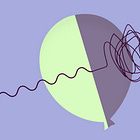The value of the festival
Celebrations are high-cost and short-lived, but they mean everything
When this post is published, I will be under the Las Vegas sun, helping piece together a gigantic video game installation. Around me, the track of the Motor Speedway will be in its final stages of transformation into the Electric Daisy Carnival.
In case you’re not familiar, Electric Daisy Carnival (EDC) is an electronic dance music festival that has been around for over 25 years. Its primary 3-day event in Las Vegas is the largest music festival in the United States.
I went to EDC Las Vegas for this work project for the first time two years ago. Everything about it was completely new to me then.
If you had asked me for one single take-away from the experience, it would be my astonishment at the magnitude of the festival’s production. It is simply mind-blowing how much labor human beings are willing to invest just so other humans can have a ton of fun for one weekend.
Of course it’s not just for the sake of one weekend. It can’t be. It wouldn’t make any sense. The fact that EDC exists at all is the only evidence I’ll ever need for the lasting emotional value and meaningfulness of collective entertainment experiences. These celebrations reverberate through our lives and fuel us for a long time after.
BTS member RM shared this perspective in one of their tour documentaries (from the translated subtitles):
“Honestly, this is a matter of quantity and quality. This is how I put it…. The festival is short. But the preparation time and the clean up afterward, all the work behind it, it takes a long time. Despite all that, people prepare the festival every year. They wait for it. Honestly, there are a lot more difficult moments for people in a quantitative aspect. But on the other hand, those happy moments, it’s intense.… That’s why people can’t forget those moments. It’s so precious” (2019).
“Precious,” I feel, is very close to “sacred.” And it’s not unusual for people to talk about their concert or festival experiences as something spiritual.
There is so much we could choose to celebrate as sacred. Remember the solar eclipse from just last month in North America? The peak total eclipse itself lasted only a few minutes at each location. Yet people planned special events (and pilgrimage-like travel) that turned the occasion into a full-blown festival, stretching across the path of totality and beyond.
Because I am not only talking about music festivals, but festivals as a larger cultural idea: the human activity that is as old as humanity.
I like sociologist Émile Durkheim’s views on this matter. His theories from about 100 years ago are now being supported by modern psychological research (Rimé & Páez, 2023). Durkheim reasoned that “collective assemblies”—festival and ceremonial gatherings of all sorts—were the foundations of society and essential for well-being.
Daily life can make us feel isolated from one another. Durkheim argued that it is only through “periodic reunions” (qtd. p. 1) that we become reenergized by the collective, “revive common faith” (p. 1), and reintegrate ourselves into a social fabric. Then, with a “feeling of group belonging and their faith in collective representations being revitalized, participants can return to their individual occupations and face daily life with a sense of power and meaning” (Rimé & Páez, 2023, p. 2).
That’s essentially what EDC attendees, known as Headliners, say when you ask them about their experiences.
In a series of interviews with Headliners several months after their festival experience, one of the major themes that emerged was self-reported changes (Little et al., 2018). Many people carried the values embedded at EDC into their normal lives. Those values can be summed up with the acronym PLUR: peace, love, unity, and respect.
Influenced by the positive social environment of the festival, interviewees made an effort to be kinder and to not “sweat the small stuff” (p. 18) after EDC. One Headliner said the experience prompts a person to “step back and look at the things that you do…and reset your mentality” (p. 19). Another said that “for like the next month, I was almost re-energized…. my faith in humanity had kind of been restored” (p. 19).
In addition to self-reported changes, the two other overarching themes from the Headliner interviews were communitas (a social experience of unity, connection, and belonging) and the opportunity to escape from daily life and conventional norms. The specifics of how these themes show up may be particular to EDC and rave culture, like the role of PLUR. But the overall pattern aligns with major elements of music festival experience shared by attendees of other events around the world—spanning genres like pop, rock, and even folk music (Ballantyne et al., 2014; Brown, 2023; Mulder & Hitters, 2021).
I feel there is an emerging consensus across these studies, even though they all use different frameworks. Basically, what people value in a music festival is the music (duh), the feeling of community and a positive social experience, and an enjoyable environment that provides an escape from reality. And unsurprisingly to me, the feeling of connection is often found to be the most salient (e.g. Mulder & Hitters, 2021) and the most strongly related to well-being outcomes (e.g. Ballantyne et al., 2014).
Escapism is absolutely key to the experience too. I used to have complicated feelings about that word. Something from my video game design days, where it felt like a moral judgment for wasting away on the couch and avoiding your responsibilities. And can we really call something “escapist” if it enhances the life we are supposedly running from?
To “revive” ourselves as Durkheim said, or to “reset our mentalities” in the words of one Headliner, we need to transport ourselves and disrupt our day-to-day reality. Call it escapism, or a “separation experience” (Ballantyne et al., 2014), or whatever you like. I’ve mentioned before that I love Priya Parker’s wording: we go to a temporary alternative world.
All designed experiences are temporary alternative worlds, and a festival is the most perfect example. EDC Las Vegas is a portal that opens for only 3 nights in a year. It simply doesn’t exist at any other time. It couldn’t. Not only would the festival lose its meaning if it were always accessible, but it would be practically impossible. Both organizers and Headliners pour everything, body and soul, into those few nights. (Plus all the work throughout the rest of the year to make it happen.) Festivals might be revitalizing but they are also utterly exhausting. Quantity and quality.
And somehow, the festival is also home. That’s literally, officially, how people talk about it. At EDC’s entry gates, first timers and returners alike are greeted by a large banner proclaiming, “Welcome home.”
I understand. I could take an inventory of the nights and locations where I felt I was home: two nights at the Rose Bowl in 2019, four nights at SoFi Stadium in 2021, and so on. Places I had never technically been to before, that I can technically never return to.
It’s a contradiction. We escape by… going home? But that’s really how it feels. We find value in the festival because it is so incredibly out of the ordinary, and at the same time because it feels so comfortable and safe.
What I’m really trying to say is, it’s worth it.
All the effort, time, and resources that go into celebrating the 3 night EDM festival, or the 2 hour concert, or the 4 minute eclipse… it’s all worth it. It’s worth all of the ways we extend the experience with travel and additional gatherings, through camping or staying at themed hotels, and of course by savoring, reflecting, and holding space for it afterwards. It’s even worth the moments of pain and exhaustion that surely come.
If the cost ever seems to mismatch the value in a quantitative sense, then we are probably using the wrong measuring stick.
Dear Afterpartiers,
You may not hear from me next week as I’m resting and recovering from EDC. Or maybe you will, and I’ll send you a chaotic poem about my state of post-festival disarray. In fact most of what I can share in the next month and a half may be like that, as I’ll have several back-to-back trips worth of various experiences to “unpack” with you.
I’m glad to having you along for the journey with me. 🎈
UPDATE:
Afterparty talk
What are (or have been) your favorite festivals and celebrations? Why are they important to you? Do they offer a sense of escapism, of home, or both? How did you feel after they ended?
Party on
Share this post to keep the conversation going.
References
Ballantyne, J., Ballantyne, R., & Packer, J. (2014). Designing and managing music festival experiences to enhance attendees' psychological and social benefits. Musicae Scientiae, 18(1), 65-83.
Brown, A. E. (2023). Cocreation and engagement: What festivalgoers want in the UK rock festival experience. Event Management, 27(2), 201-216.
Little, N., Burger, B., & Croucher, S. M. (2018). EDM and ecstasy: The lived experiences of electronic dance music festival attendees. Journal of New Music Research, 47(1), 78-95. Retrieved (and citing page numbers) from here.
Mulder, M. & Hitters, E. (2021). Visiting pop concerts and festivals: Measuring the value of an integrated live music motivation scale. Cultural Trends, 30(4), 355-375.
Rimé, B. & Páez, D. (2023). Why we gather: A new look, empirically documented, at Émile Durkheim’s theory of collective assemblies and collective effervescence. Perspectives on Psychological Science, 18(6), 1-25.
Quote of RM (2019). Ep3. RELATIONSHIP - BRING THE SOUL: DOCU-SERIES. Weverse.











This somehow reminds me of the life of a caterer😉 Great article…its like I can hear your voice reading it out loud